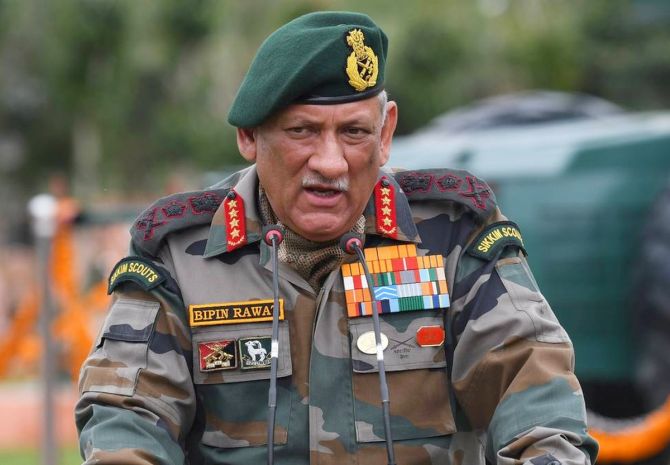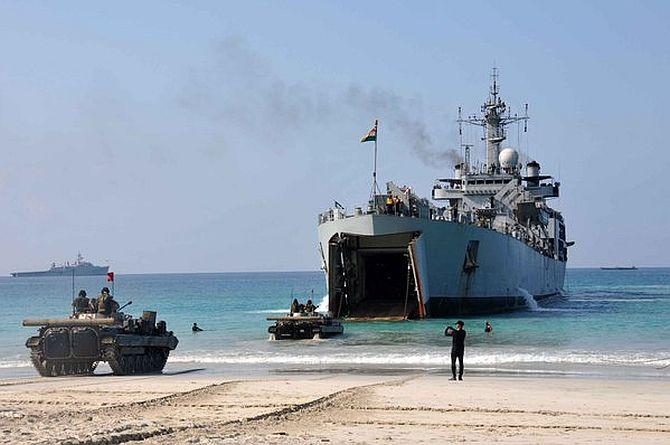 | « Back to article | Print this article |
Before migrating into the theatre command concept, it would be worthwhile to study the shortfalls experienced by the Tri Services Command in the Andaman and Nicobar islands and make good the deficiencies, suggests Commodore Venugopal Menon (retd).

While the defence secretary continues to be the principal defence policy advisor to the government, the newly appointed Chief of Defence Staff, as the professional head of the Indian armed forces, besides being the head of the Department of Military Affairs under the ministry of defence, will serve as the senior most uniformed military advisor to the government.
In the Integrated Defence staff, the CDS is the Chairman of Joint Commanders and the Chiefs of Staff committee.
As the service head of the armed forces, the CDS is assisted by the three chiefs of staff of the Indian Army, the Indian Navy and the Indian Air Force.
The CDS is expected to play a critical role in today's era of hybrid warfare by ensuring that the three Services function in a coordinated and mutually reinforcing manner, thereby enhancing their overall combat capabilities and optimally utilising the infrastructures.
At present, the CDS, as a four-star general, is the first among the service chiefs of equivalent rank, but if he is to be really effective, it is necessary to raise his rank to that of a five-star general.
As part of the modernisation and capacity-building process, the CDS has reportedly taken up the restructuring of the existing regional commands as theatre commands by 2022.
The five theatre commands envisaged are the Northern Command, the Western Command, the Peninsular command, the Air Defence Command and the Marine command.
While in theory and on paper, there may be arguments justifying their creation, the present is really not the time to undertake such a massive exercise.
For one thing, it will have a distracting effect on the existing system which has stood the test of time in tune with India's security needs and threat perception, budgetary constraints, and available manpower, and technical and infrastructural resources.
For another, and more importantly, it may have the effect of diluting the preparedness and effectiveness of the existing command structure and causing confusion in the overall command and control.
The Indian armed forces is organised into regional commands since independence. Each of the commands has a regional jurisdiction.
Basically, the command-wise structure of the Indian armed forces is suited to the country's geopolitically assessed threat perception from China and Pakistan.
In addition to regional commands, the Indian Army and Indian Air Force have a separate training command. The Indian Air Force has a Maintenance command in addition.
The Tri Services Command in the Andaman and Nicobar islands was formed in 2001 to safeguard India's strategic interests in South East Asia and the Strait of Malacca.
A Strategic Forces Command was also set up in 2003, which is responsible for the management and administration of the country's tactical and strategic nuclear weapons stockpile.
In sum, the Indian Army is divided into six regional commands and one training command. The Indian Air Force is divided into five regional commands, one training command and one maintenance command. The Indian Navy is divided into three regional/geographic commands to safeguard the western and eastern seaboards.
The proposed integrated theatre command envisages a unified command of the three services under a single commander for geographical theatres that are of security concern.
The commander of such a force is supposed to be able to deploy the resources at his disposal from all three services with seamless efficacy.
The term theatre of operations is typically an American concept and is defined as land and sea areas to be defended or invaded in geographical theatres including areas necessary for administrative activities incidental to military operations.
As per this concept, the US has divided the world into different geographic theatres to protect US interests overseas, provide security umbrella for allies and maintain balance of power through display of its capability for deterrence.
It makes sense for US defence strategy which is focused only on their strategic interests overseas as they do not foresee any threat to the homeland.
None of these factors is applicable to the Indian context. India's threat perception is proximate and land centric mainly from China and Pakistan.
Chinese engagement in the Indian Ocean has resulted in India looking at the maritime domain with concern only recently.
Before India starts moving towards a theatre command concept, it needs a realistic vision document about what its strategic interests are, what the specific roles of the theatre commands will be, flowing from those interests, and what model of command and control, whether the Joint Chiefs of Staff model, followed by the US, or any other, will suit Indian conditions.
This has to be a deliberate decision taken after a detailed study by a dedicated task force in which the three services are involved, taking into consideration the existing assets and the nature of the new assets that might be required, and the extent to which the need can be met within the scope of available resources.
It must be remembered that theatre commands work best when they have dedicated assets. Even as things are, the three services are hamstrung by scant assets.
The Andaman Nicobar Command did not take off as expected because each service was reluctant to allocate the needed resources.
Hence it would be farfetched to assume that it will be possible to generate adequate resources for allocation to theatre commands in a short span of two years.

The Indian armed forces concept of operations (CONOPS) is driven by the doctrines and tactics followed by individual services.
They have little experience in joint operations except to a limited extent in amphibious warfare.
Formation of theatre commands will necessarily call for qualified and experienced personnel in joint operations being positioned in pivotal assignments.
A durable and dependable foundation for joint operations by means of efficient and effective theatre commands will be possible only after building up expertise and creation of a pool of officers and putting them through a rigorous training process.
This, in turn, will involve working out doctrines for joint operations to achieve assigned objectives in modern warfare in various scenarios and through the redesigning of the syllabus and curriculum in line with them.
Each country has a time-tested command structure of the armed forces in place based on its grand strategy, threat perceptions, geography and nature of wars.
Modern warfare undoubtedly requires greater synergy between the services. However, the restructuring of the command system to meet the challenges has to be undertaken in a gradual and deliberate manner. Quick fix solutions to suit a political or a personal agenda could prove counterproductive.
I am of the view that before migrating into the theatre command concept, it would be worthwhile to study the shortfalls experienced by the Tri Services Command in the Andaman and Nicobar islands and make good the deficiencies.
The rejuvenated Tri Services Command could then be graduated into a full-fledged theatre command by ploughing in additional resources, carrying out course corrections and expanding the role.
The experience gained by this exercise could then be put to use in developing a running working model of a theatre command which is best suited for the Indian context.
A successful model thus put in place could be used as a yardstick to restructure existing regional commands for joint operations in a progressive manner.
This process may take time, but it will be well worth it since the system so designed would be in India's best interests.
Commodore Venugopal Menon served in the Indian Navy for 29 years in operational roles, including commands at sea, and training and staff assignments at Naval HQ.
In addition to the staff and war courses in the Indian Navy, he underwent the executive course at the Asia Pacific Centre for Security Studies, Honolulu.
Post retirement he worked in Oman as the head of operations and logistics for a shipping company.
Feature Presentation: Rajesh Alva/Rediff.com